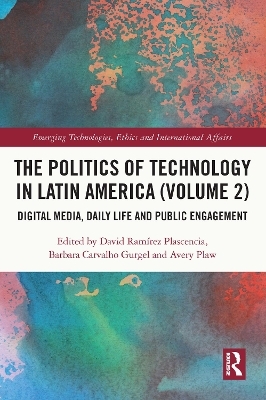
The Politics of Technology in Latin America (Volume 2)
Routledge (Verlag)
978-0-367-67789-3 (ISBN)
The book is divided into three parts:
‘Digital Media and Daily Life in Latin America’ explores cases related to the integration of digital media such as mobile devices, social platforms and, even, drones to diverse commercial, private and social activities.
‘Information technologies and civic engagement’ gives special attention to the new political practices triggered by the irruption of smartphones and platforms, especially inside organizations and social movements in Latin America.
‘Journalism and Media Integrity in the Age of Post-truth’ centers on the study of digital journalism and the new media landscape, and related issues like precarization of labor conditions and the crisis of reliability in media.
This second volume in a two volume set will be important reading for scholars and students of social use of digital media in Latin America, civic engagement, and the connections between politics, journalism and technology.
David Ramírez Plascencia is a professor at the University of Guadalajara, specializing in the study of information law and digital policies. Barbara Carvalho Gurgel has a bachelor’s degree in Political Science from the University of Massachusetts Dartmouth (USA), and is working toward a master’s degree in Journalism from the Harvard Extension School (USA). Professor Avery Plaw specialized in political theory and international relations, with a particular focus on strategic studies.
Chapter 1. Introduction. Part. I. Digital Media and Daily Life in Latin America. Chapter 2. Drone Ethics and Legal Regulation, Comparative Drone Law in Latin American countries. Chapter 3. Net-narcoculture. Discursive trends on femicide violence and youth culture in the consumption of the narcorap aesthetics versus feminist rap resistances. Chapter 4. COVID-19 Confinement-related Mental Disorders: Morbidity and the Remedial Use of ICT in Hispanic Societies. Chapter 5. Speaking for Communities and Against Oppression: Digital Media Responses to COVID-19 within Marginalized Communities of Brazil and Mexico. Part. II. Information technologies and civil engagement. Chapter 6. Social media as an instrument of activism for feminist university students in Mexico: the cases of MOFFyL and Uni Unida. Chapter 7. Latin American Indigenous Media Productions: Digital Artefacts of Contestation. Chapter 8. Digital media in citizen participation and collective action for spatial justice. Chapter 9. Social Media and Political Polarization in Latin America: analyzing online discussions during the 2018 presidential campaign in Colombia. Part III. Journalism and Media Integrity in the Age of Post-truth. Chapter 10. Digital Native Media in Central America: Reshaping the Online News Sphere. Chapter 11. Disinformation and news consumption in a polarized society: An analysis of the case of Venezuela. Chapter 12. Social Media in a Post-truth Age: Discursive Roles of Fake News About Marielle Franco. Chapter 13. Collaborative Journalism vs. Disinformation: An Approach to Fact-Checking Projects in Mexico, Argentina, Colombia, Brazil, and Spain. Chapter 14. Conclusion.
| Erscheinungsdatum | 13.07.2022 |
|---|---|
| Reihe/Serie | Emerging Technologies, Ethics and International Affairs |
| Zusatzinfo | 19 Tables, black and white; 8 Line drawings, black and white; 6 Halftones, black and white; 14 Illustrations, black and white |
| Verlagsort | London |
| Sprache | englisch |
| Maße | 156 x 234 mm |
| Gewicht | 358 g |
| Themenwelt | Sozialwissenschaften ► Ethnologie |
| Sozialwissenschaften ► Politik / Verwaltung | |
| Sozialwissenschaften ► Soziologie ► Spezielle Soziologien | |
| ISBN-10 | 0-367-67789-X / 036767789X |
| ISBN-13 | 978-0-367-67789-3 / 9780367677893 |
| Zustand | Neuware |
| Haben Sie eine Frage zum Produkt? |
aus dem Bereich


